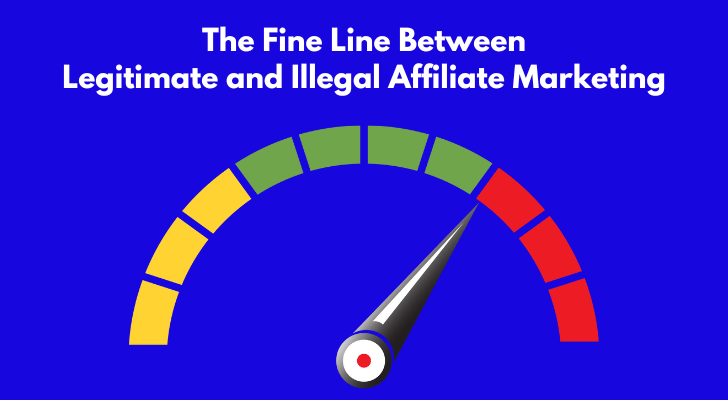Literally, millions of blog articles have already claimed that affiliate marketing is a good way to make money online. So you probably know by now that there is a fine line between what is legitimate and what is illegal in the world of affiliate marketing.
The Federal Trade Commission has cracked down on illegal practices, but scammers still find ways to deceive unsuspecting users. There is a grey area of affiliate marketing, so I will share with you not just how to avoid being scammed by illegitimate marketers and also how not to become one. a day.

Did You Know?
- Annual Losses: Businesses lose over $1.4 billion annually due to affiliate fraud.
- Prevalence: Approximately 38% of marketers have experienced affiliate fraud.
- Types of Fraud: About 36% of affiliate fraud is attributed to cookie stuffing.
- Deceptive Advertising: 33% of affiliate fraud involves deceptive advertising practices.
- Phishing: Phishing schemes account for 22% of affiliate marketing fraud.
The Difference Between Legitimate and Illegal Affiliate Marketing Practices
Legitimate affiliate marketing practices involve promoting products to potential customers. This is done through unique links, which are provided by the company being promoted. When a customer clicks on the link and makes a purchase, the affiliate marketer earns a commission.
On the other hand, illegal affiliate marketing practices typically involve using deceptive tactics to make money. Some examples include spamming people with unsolicited emails, making false claims about a product, and creating fake reviews to entice people into buying something.
Here are some key differences between the two:
Transparency and Disclosure
Legit: Legitimate affiliate marketers prioritize transparency by clearly disclosing their affiliate relationships and any potential biases. They openly state that they may receive a commission for recommending certain products.
Illigal: Illegal practices often involve omitting such disclosures, misleading users, or pretending to provide unbiased recommendations.
Compliance with Laws and Regulations
Legit: They adhere to applicable laws and regulations, such as those related to consumer protection, advertising, and privacy. They obtain necessary permits, licenses, or certifications if required.
Illegal: They involve engaging in fraudulent activities, violating intellectual property rights, or operating in prohibited niches (e.g., promoting illegal substances).
Did You Know?
- Refund Fraud: Approximately 19% of fraudulent affiliate sales result in refunds due to customer disputes.
- Cloaking: 17% of fraud involves cloaking, where affiliates disguise the true nature of their traffic sources.
- Hidden Links: 15% of fraudulent affiliates use hidden links to mislead consumers and search engines.
- Mobile Fraud: Mobile click fraud in affiliate marketing grew by 50% in the last year.
- Fake Leads: Businesses report that 14% of affiliate-generated leads are fake.
Quality and Relevance of Recommendations
Legit: They focus on providing value to their visitomers by recommending products that are relevant, high-quality, and genuinely beneficial. They strive to build trust by sharing honest opinions and experiences.
Illegal: They involve promoting low-quality products, using deceptive tactics to make false claims, or misleading users about the benefits or features of a product/service.
Compliance with Affiliate Program Terms
Legit: They adhere to the terms and conditions of the affiliate programs they join. They respect program guidelines, including restrictions on promotional methods, the use of trademarks, or spamming.
Illegal: They involve violating these terms, engaging in unauthorized advertising, or using prohibited tactics to increase traffic artificially.
Ethical Marketing Techniques
Legit: They employ ethical marketing techniques, such as providing accurate and unbiased information, respecting user privacy, and avoiding aggressive, manipulative tactics. They aim to build long-term relationships with users.
Illegal: They include spamming, engaging in black hat SEO techniques, using misleading advertising, or employing unsolicited email marketing (spam).
Compensation and Payment
Legit: They receive compensation through agreed-upon commission structures, and their earnings are transparently tracked and reported. They ensure that they receive payment for legitimate actions.
Illegal: They may involve engaging in fraudulent activities, such as cookie stuffing, fake referrals, or unauthorized alteration of tracking links to receive undeserved commissions.
What's The "Gray Area"?

The gray area of legitimate and illegal affiliate marketing practices refers to practices that may fall into a somewhat ambiguous zone, where it can be challenging to determine whether they are fully ethical and legal or cross certain boundaries. Here are a few examples of such gray areas:
#1 Native Advertising
Native advertising involves seamlessly integrating promotional content within a platform, such as sponsored articles/videos that closely resemble regular content. While disclosure requirements exist in most jurisdictions, the line between transparent native advertising and deceptive practices can be blurry.
Example:
Let's say there's a popular lifestyle blog that regularly publishes articles on fashion, beauty, and wellness. The blog has a large readership and earns revenue through affiliate marketing. A well-known cosmetics brand approaches the blog with a native advertising opportunity.
In this scenario, the cosmetics brand could propose creating a sponsored article that fits seamlessly with the blog's content style and provides valuable information to the readers. The article could focus on skincare tips and incorporate the cosmetics brand's products as part of the recommendations.
To maintain transparency and meet legal requirements, the blog would disclose that the article is sponsored by the cosmetics brand and that the recommendations include affiliate links. These disclosures could be placed at the beginning or end of the article.
The sponsored article would resemble the blog's regular articles in terms of writing style, tone, and format, making it difficult for readers to distinguish it as promotional content. The key difference is the explicit disclosure of the sponsorship and affiliate links, ensuring transparency and giving readers the choice to engage with the affiliate content.
By blending in with the blog's regular content, the cosmetics brand aims to earn user's trust to generate sales through the affiliate links. The blog benefits by receiving compensation for promoting the cosmetics brand's products.
It's crucial for affiliates to ensure that disclosures are prominent and clearly distinguishable to avoid misleading users.
#2 Incentivized Reviews
Some affiliates offer incentives, such as free products, cash rewards, or exclusive content, to encourage customers to write positive reviews. While incentivizing reviews itself is not illegal, it can raise ethical concerns if it leads to biased or misleading feedback.
Example:
An affiliate marketer promotes a specific brand of fitness supplements. As part of its marketing strategy, the affiliate offers free product samples to customers who write positive reviews about the supplements on its website.
In this scenario, customers who receive the free product samples may feel obligated to write positive reviews, even if their experience with the supplements doesn't warrant such praise. This can lead to biased and potentially misleading feedback, as the customers' opinions may be influenced by the incentive rather than their genuine experience.
For instance, a customer who didn't find the supplements effective might feel compelled to write a positive review in order to receive future incentives. This could mislead other potential customers who rely on reviews to make purchasing decisions.
Such practices raise ethical concerns because they compromise the integrity and authenticity of customer reviews.
Reviews are an essential source of information for consumers, and they rely on them to gauge the quality and effectiveness of products. When incentivized reviews are biased or misleading, it's letting customers make the wrong decisions.
To maintain ethical standards, affiliate marketers should ensure that incentives for reviews do not influence the authenticity and honesty of the feedback. This can be achieved by implementing the following practices:
- Encourage genuine feedback: Instead of offering incentives for positive reviews, affiliates can encourage customers to provide honest and comprehensive feedback, regardless of whether it's positive or negative.
- Disclose the incentive: If affiliates do offer incentives for reviews, it's crucial to disclose this information to consumers. Transparency allows readers to consider the potential bias associated with the review.
- Provide guidelines: Affiliates can provide guidelines to customers when leaving reviews, emphasizing the importance of truthful and unbiased feedback. This helps maintain the integrity of the review process.
Transparency and honesty are key, and affiliates should clearly disclose any incentives received when sharing reviews.
Did You Know?
- Geo-Targeting Fraud: 12% of fraudulent activities involve geo-targeting manipulation to generate unearned commissions.
- Ad Injection: Ad injection fraud affects 10% of all affiliate marketing campaigns.
- Consumer Trust: 29% of consumers have lost trust in online reviews due to affiliate marketing fraud.
- Legal Actions: Only 8% of businesses take legal action against fraudulent affiliates due to the complexity and cost.
- Detection Tools: 45% of marketers believe that existing fraud detection tools are insufficient to catch all affiliate fraud activities.
#3 Coupon and Deal Sites

Coupon and deal sites often provide affiliate links that offer special offers to consumers. However, in some cases, affiliates may use misleading deals to inflate their earnings. While using coupons and deals is generally acceptable, intentionally misleading users or misrepresenting the availability of discounts is unethical and could potentially cross into illegal territory.
Example:
There is a popular coupon and deal site that provides users with discounts and special offers for various products and services. Affiliates can earn commissions by promoting these deals through affiliate links on the site.
In this scenario, an affiliate marketer notices a high-demand product with a limited-time discount. They decide to promote this deal on the coupon and deal site to attract traffic and potentially earn higher commissions. However, instead of providing accurate and up-to-date information, the affiliate intentionally uses a misleading deal that appears to be valid but has actually expired.
When users visit the coupon and deal site, they see the discounted offer and click on the affiliate link to purchase the product. However, upon reaching the merchant's website, they discover that the discount code is invalid. Users may feel frustrated and misled, potentially damaging their reputation in both the coupon site and the merchant.
This unethical practice of using misleading deals aims to drive traffic and potentially increase earnings for the affiliate marketer. By misleading users into clicking on their affiliate links, the marketer may generate more clicks or sales, thereby inflating their commissions at the expense of user satisfaction.
Such practices not only deceive consumers but also harm the reputation of the coupon and deal site and the merchants involved. They undermine the purpose of coupon and deal platforms, which is to provide users with accurate and beneficial discounts.
To maintain ethical standards, coupon and deal affiliates should adhere to the following guidelines:
- Verify and update deals: Affiliates should ensure that the deals they promote on the coupon and deal sites are accurate, valid, and up-to-date. Regularly verifying and updating the deals helps prevent misleading users with incorrect information.
- Disclose deal terms: Affiliates should clearly disclose any terms and conditions associated with the deals, such as expiration dates, usage limitations, or any requirements to receive the discount. Transparency allows users to make fair decisions.
- Regularly monitor deals: Affiliates need to monitor the deals they promote and promptly remove or update any deals that have expired. This helps maintain the integrity of the coupon and deal site and ensures a positive user experience.
By prioritizing accuracy, transparency, and user satisfaction, coupon and deal affiliates can offer a valuable service that benefits both consumers and merchants.
#4 Aggressive Sales Tactics
While persuasive marketing techniques are common in affiliate marketing, there is a fine line between legitimate persuasion and aggressive tactics. Tactics such as excessive urgency, false scarcity, or persistent pop-ups can become manipulative and push users into making hasty decisions.
Examples:
- Excessive Urgency: The marketer uses exaggerated claims of urgency to create a sense of fear of missing out. They may display countdown timers, flash sales banners, or pop-ups claiming limited availability. For example, the marketer might state, "Only 3 copies left at this special price! Buy now before it's too late!" This tactic creates a false sense of urgency and may push users to make impulsive decisions without fully evaluating the product or considering their needs.
- False Scarcity: The marketer artificially creates the perception of limited availability of the product, even if there's no genuine shortage. They may use phrases like "limited stock," "exclusive offer for a select few," or "only available to the first 50 customers." This tactic aims to trigger a fear of missing out, causing users to make a purchase hastily, even if the scarcity claims are false.
- Persistent Pop-ups: The marketer bombards users with persistent pop-ups that interrupt their browsing experience and hinder their ability to make good decisions. These pop-ups may use aggressive language, such as "Act now or lose this incredible opportunity forever!" or "Unlock exclusive bonuses, but only if you buy immediately!" This tactic can be intrusive and manipulative, pressuring users into making a quick decision without fully considering the product's value.
Affiliates should strive to strike a balance between effective marketing and respecting the user's autonomy and decision-making process.
#5 Gray-Hat SEO Techniques
Some SEO practices exist in a gray area - here are some of the gray-hat SEO techniques;
Examples:
- Private Blog Networks (PBNs): As mentioned earlier, PBNs involve creating a network of interconnected websites solely to build backlinks to manipulate search engine rankings. Website owners often use expired or purchased domains with existing authority or backlinks to create the network. PBNs are considered a grey-hat technique because they attempt to artificially manipulate search engine rankings by building unnatural and manipulative backlinks.
- Guest Post Networks: Guest post networks involve joining a network of websites where members publish guest posts on each other's sites to gain backlinks. These networks aim to increase the number of backlinks to specific websites artificially. While guest posting itself is a legitimate strategy, participating in large-scale guest post networks solely to acquire backlinks can be seen as a manipulative technique.
- Link Exchanges: Link exchanges involve a mutual agreement between two website owners to exchange backlinks. The intent is to artificially increase the number of backlinks to each other's sites. While some link exchanges may occur naturally and organically, engaging in large-scale link exchanges purely to manipulate search engine rankings can be considered a grey-hat technique.
- Automated Content Generation: This technique involves using software to automatically generate content, typically in the form of blog posts or articles. The content produced is often low-quality and lacks originality or value. While automation can be used to assist with content creation, relying heavily on automated content generation without human input is seen as a grey-hat practice.
- Social Media Buying/Following: This technique involves purchasing likes, followers, shares, or engagement on social media to create an artificial perception of popularity and influence. While social media can be an important marketing channel, buying social media metrics undermines the authenticity and integrity of social media platforms and is considered a questionable grey-hat technique.
FTC
The Federal Trade Commission is a regulatory agency in the United States that plays a crucial role in overseeing and regulating various aspects of affiliate marketing. The FTC's primary objective is to protect consumers from deceptive, unfair, and fraudulent business practices. In the context of affiliate marketing, the FTC focuses on ensuring that affiliate marketers and advertisers comply with truth-in-advertising laws.
The key responsibilities of the FTC are;
- To ensure that advertisers provide clear and truthful information about their products. This includes disclosing any material connections between advertisers and affiliates, such as compensation or free products.
- To target false advertising claims made by affiliate marketers. For example, if an affiliate marketer promotes a product with exaggerated claims about its safety without providing adequate evidence to back up those claims, they could be subject to enforcement action from the FTC.
- To prevent illegal activity in the affiliate marketing industry, the FTC regularly updates its guidelines for online advertising practices. These guidelines help businesses better understand how to comply with regulations while still engaging in effective marketing strategies.

How To Avoid Being Scammed by Illegal Affiliate Marketers
Don't let that discourage you from getting involved in legitimate affiliate marketing opportunities. Because there are some easy measures that you can take:
- Google the Affiliate Program: Before reaching out to an affiliate program, Google the name of the program. Look for reviews, testimonials, and ratings from other users to gauge the legitimacy and credibility of the program. Verify their reputation and track record in the industry.
- Verify Affiliate Links: When clicking on affiliate links, pay attention to the URL and ensure it directs you to a legitimate and trustworthy website. Be cautious of unfamiliar URLs that might lead to scams attempts.
- Check Disclosure and Transparency: Legitimate affiliate marketers should clearly disclose their relationship with the products they promote. Look for clear and conspicuous disclosures on their website content. If an affiliate fails to disclose their affiliation, it could be a red flag.
- Evaluate the Quality of Content: Legitimate affiliate marketers typically provide valuable and informative content related to the products they promote. Be wary of marketers who solely focus on sales pitches.
- Be Skeptical of Unrealistic Claims: If an affiliate marketer promises excessively high earnings or guarantees unrealistic results, it's likely too good to be true. Avoid falling for exaggerated claims and quick-money schemes.
- Use Secure Payment Methods: When making purchases through affiliate links, use secure payment methods that offer buyer protection. Avoid sharing sensitive information or making payments through unsecured platforms.
And How Not To Scam People
Even if you don't intend to scam people, you can still unknowingly do it sometimes. This could be due to a lack of awareness about the particular situation, leading to unintentional mistakes such as not disclosing all relevant information when selling something online. For example;
- Promoting Low-Quality Products: If you unknowingly promote products that are unreliable, of poor quality, or do not deliver on their promises, it will create a negative experience for the users. Hence it will damage your credibility as an affiliate and potentially be seen as a scam if customers feel cheated.
- Not Verifying Affiliate Programs: Before you work with specific merchants, you should research their reputation, track record, and customer feedback.
- Misinterpreting Affiliate Program Policies: Each affiliate program has its own set of guidelines that affiliates must adhere to. Misunderstanding them can result in unintentional violations. For example, promoting prohibited products or using prohibited marketing tactics could unknowingly lead to scam-like activities.
- Lack of Transparency in Disclosures: Disclosures are a critical aspect of affiliate marketing. If you unintentionally fail to disclose your affiliate relationships, you'll create an impression of deception. Clear and transparent disclosures are necessary.
- Inaccurate or Misleading Product Information: If you unknowingly provide misleading information about a product, it can lead to false expectations or misunderstandings. This can result in a perception of scamming if customers feel they were misled about the product's benefits.
Here are some tips to ensure you stay on the right side of the law and ethical practices as an affiliate marketer:
Familiarize Yourself with Applicable Laws and Regulations
Understand the legal requirements and regulations related to affiliate marketing in your jurisdiction. This may include consumer protection laws, advertising guidelines, and disclosure requirements set forth by government agencies such as the FTC.
Comply with Disclosure Guidelines
Disclose your affiliate relationships clearly and conspicuously. Use language that is easily understandable by anyone. Disclosures should be placed in a prominent position where users can easily see and understand them. Be transparent about the benefits you may receive from promoting products.
Provide Honest and Transparent Recommendations
Ensure that your product recommendations and reviews are honest, accurate, and based on your genuine experience. Avoid making exaggerated statements about the products or services you promote.
Be Mindful of Intellectual Property Rights
Respect intellectual property rights such as trademarks, copyrights, and patents. Do not use any copyrighted material without proper authorization, and avoid infringing on the rights of others.
Avoid Unethical Tactics
Refrain from engaging in deceptive practices such as false scarcity, fake testimonials, or misleading information. Provide accurate and reliable information.
Stay Updated on Industry Guidelines
Keep yourself informed about industry best practices and guidelines related to affiliate marketing. Stay up-to-date with any changes in regulations that may impact your affiliate marketing activities.
Focus on Building Trust and Providing Value
Offer valuable content, unbiased recommendations, and transparent communication. Establish yourself as an authority in your niche through genuine expertise and helpful information.
Regularly Review and Audit Your Marketing Practices
Conduct regular reviews of your affiliate marketing activities to ensure compliance with legal and ethical standards. Regularly assess your content, disclosures, and promotional strategies to identify and address any potential issues.
Legitimate affiliate marketing offers many opportunities for success without resorting to shady tactics. By embracing transparency and honesty in your efforts as an affiliate marketer, you can build long-term relationships with merchants while earning a steady income from commissions.
